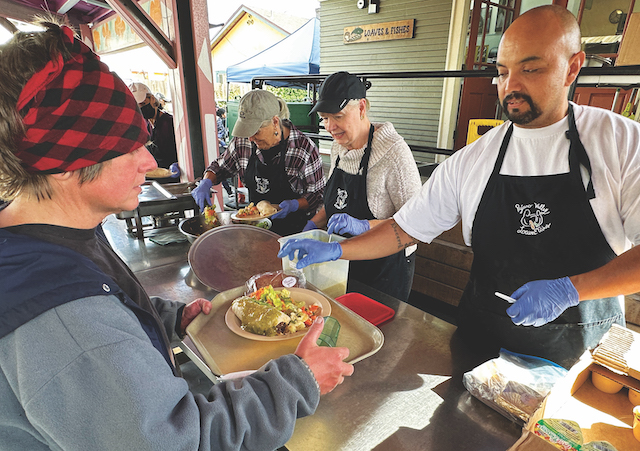Santa Cruz County’s vast, verdant fields are known for providing berries, fruits and vegetables throughout the world. Behind the scenes—and keeping this industry running—are the farm workers who toil year-round under difficult conditions.
The irony of the farmworkers who cultivate this food is that too often, they cannot afford the food they help produce and are relegated to living in squalid conditions.
Local organizations, like the Center for Farmworker Families and Pajaro Valley Loaves and Fishes, try to advocate for farmworker rights and help put food on their tables.
Center for Farmworker Families
In 1993, when President Bill Clinton signed the North American Free Trade Agreement (NAFTA) into law, it had immediate and far-reaching effects for many.
Before NAFTA, roughly 11 million people in Mexico farmed a wide variety of corn, a number that was reduced to 4 million after its passage, said Dr. Anne Lopez. Her organization, Center for Farmworker Families (CFF), provides a wide range of assistance for the people who labor in the local agricultural industry.
“I sat in rooms and listened to farmworker stories,” she said. “I listened to the sadness, the anger, all of that from losing their farms. I was absolutely appalled. To see these people so distressed by a policy that we pushed and benefitted from was just overwhelmingly disturbing to me.”
CFF works with local organizations such as Second Harvest Food Bank to provide food and household supplies to families.
The organization also offers Farmworker Reality Tours, where groups go into the fields to meet workers and hear their stories.
In addition, CFF’s Bridging the Digital Divide classes give computer literacy classes to farmworkers, along with free computers and internet.
Lopez also advocates for cessation of dangerous agricultural chemicals on agricultural fields.
“I meet children just about every day from farmworker families who have some kind of cancer–bone, brain, leukemia, they have deformities, learning disabilities, ADHD, autism,” Lopez said. “And this in the face of parents who hope their kids will become educated and out of farm work.
Just last week, she said she spoke with a mother who lost her 13-year-old daughter to bone cancer.
“It’s heartbreaking,” Lopez says. “Why is this allowed? These are children for god’s sake. We keep using these things and we don’t even need to. There are all kinds of studies that show that if the whole world converted to organic regenerative agriculture, we could feed the entire planet’s human population. Why aren’t we doing that?”
Pajaro Valley Loaves and Fishes
In the 34 years since it was created, Pajaro Valley Loaves and Fishes has served hot lunches to hundreds of people and provided food and household goods. Roughly 10,000 people receive help every year.
This includes during holidays and times of crisis, said executive director Ashley Bridges.
“During the pandemic, we did not close our doors once,” she said.”We stayed open, and that’s a theme with our organization. We are there to help people.”
When the Pajaro River Levee breached and flooded the town of Pajaro early in 2023, Loaves and Fishes went from serving about 100 hot lunches per day to more than 700, an effort that included bringing the meals directly to the residents, Bridges said.
And lately, people are contending with rising fuel costs and inflation.
“It’s been a nonstop year of trials for the people we serve,” she said.
More than 600 families came for a recent Thanksgiving distribution, even as hundreds signed up for a similar one for Christmas.
“We’re a small organization, but we feed a lot of people and we do the best we can,” Bridges said.
All of this is coupled with a nationwide food shortage for food banks nationwide, she said.
“I think it’s a special place,” Bridges said. “Everyone wants to be there to help people and provide food, and I personally enjoy working there.”
Volunteer Michelle Bagley, who has been working at Loaves and Fishes since March, says it has given her a sense of purpose since her retirement.
“We work hard, and we have a good time and we take care of each other,” she said.
Other Organizations Participating In Santa Cruz Gives
This organization was created by Kate Pavao and Aaron Lazenby, whose daughter Colette Elisabeth Pavao Lazenby (Coco) was killed in a car crash in 2015 when she was 12.
The organization says it works in areas that made a difference in Coco’s life, including literacy, nature and health and wellness. Among other things, it provides free books for children on their birthday, a nod to the girl’s love of reading.
Homeless Garden Project provides job training, employment and support for people experiencing homelessness.
The organization has a working farm at Natural Bridges Farm where anyone can buy fresh organic vegetables, herbs and flowers. They also offer Community Support Agriculture memberships.
Teen Kitchen Project teaches young people culinary skills, which they use to make meals for people and families affected by life-threatening illnesses such as cancer.
Santa Cruz Gives is funded by the generosity of Good Times, Volunteer Center of Santa Cruz County, Community Foundation Santa Cruz County, Applewood Foundation, Joe Collins, Driscoll’s, Inc., Monterey Peninsula Foundation, Comcast, Santa Cruz County Bank, Wynn Capital Management, The Pajaronian, and Press Banner.














